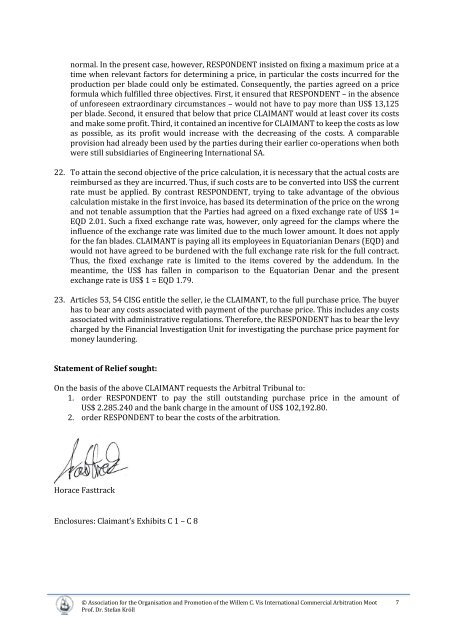THE PROBLEM
24VisMootProblem
24VisMootProblem
Create successful ePaper yourself
Turn your PDF publications into a flip-book with our unique Google optimized e-Paper software.
normal. In the present case, however, RESPONDENT insisted on fixing a maximum price at a<br />
time when relevant factors for determining a price, in particular the costs incurred for the<br />
production per blade could only be estimated. Consequently, the parties agreed on a price<br />
formula which fulfilled three objectives. First, it ensured that RESPONDENT – in the absence<br />
of unforeseen extraordinary circumstances – would not have to pay more than US$ 13,125<br />
per blade. Second, it ensured that below that price CLAIMANT would at least cover its costs<br />
and make some profit. Third, it contained an incentive for CLAIMANT to keep the costs as low<br />
as possible, as its profit would increase with the decreasing of the costs. A comparable<br />
provision had already been used by the parties during their earlier co-operations when both<br />
were still subsidiaries of Engineering International SA.<br />
22. To attain the second objective of the price calculation, it is necessary that the actual costs are<br />
reimbursed as they are incurred. Thus, if such costs are to be converted into US$ the current<br />
rate must be applied. By contrast RESPONDENT, trying to take advantage of the obvious<br />
calculation mistake in the first invoice, has based its determination of the price on the wrong<br />
and not tenable assumption that the Parties had agreed on a fixed exchange rate of US$ 1=<br />
EQD 2.01. Such a fixed exchange rate was, however, only agreed for the clamps where the<br />
influence of the exchange rate was limited due to the much lower amount. It does not apply<br />
for the fan blades. CLAIMANT is paying all its employees in Equatorianian Denars (EQD) and<br />
would not have agreed to be burdened with the full exchange rate risk for the full contract.<br />
Thus, the fixed exchange rate is limited to the items covered by the addendum. In the<br />
meantime, the US$ has fallen in comparison to the Equatorian Denar and the present<br />
exchange rate is US$ 1 = EQD 1.79.<br />
23. Articles 53, 54 CISG entitle the seller, ie the CLAIMANT, to the full purchase price. The buyer<br />
has to bear any costs associated with payment of the purchase price. This includes any costs<br />
associated with administrative regulations. Therefore, the RESPONDENT has to bear the levy<br />
charged by the Financial Investigation Unit for investigating the purchase price payment for<br />
money laundering.<br />
Statement of Relief sought:<br />
On the basis of the above CLAIMANT requests the Arbitral Tribunal to:<br />
1. order RESPONDENT to pay the still outstanding purchase price in the amount of<br />
US$ 2.285.240 and the bank charge in the amount of US$ 102,192.80.<br />
2. order RESPONDENT to bear the costs of the arbitration.<br />
Horace Fasttrack<br />
Enclosures: Claimant’s Exhibits C 1 – C 8<br />
© Association for the Organisation and Promotion of the Willem C. Vis International Commercial Arbitration Moot 7<br />
Prof. Dr. Stefan Kröll


